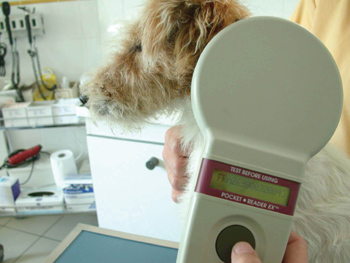
 |
An increased number of animal owners take their pet abroad, be it on a holiday or as expatriates. Great. But what if the animal slips the lead and gets lost? Even if the pet is correctly identified, and even if the local vet or rescue centre has a microchip reader, access to foreign pet ID data bases is very limited. Or was, until the recent launch of Europetnet (www.europetnet.com). Europetnet is a non-profit-making association, which links several animal databanks from various European countries into a single web site which is accessible to all. Aim of the association is to enable anyone to find the owner of an animal identified by a microchip and registered in a databank. Some animals identified by a tattoo are also registered. The site helps the finder of the animal to retrieve information about the data base where the lost pet is registered. Electronic identification (“microchipping”) of companion animals started some twelve years ago in Europe. Belgium, Spain and Great Britain were the pioneers in this field, rapidly followed by Switzerland, Luxembourg, Denmark, the Netherlands and Germany. The early days were far from easy: the public needed to be made aware of the method and the absence of standardisation made its use unpredictable. The creation and adoption of an ISO standard under the impulse of the FECAVA on European level and of the WSAVA on a world scale have contributed widely to the recognition of this identification technique. It has even become the “gold standard” for companion animal identification. In order to benefit from the advantage of an internationally recognised standard, data bases needed to be set up which were sufficiently well organised to communicate between each other. And it was with this objective that EuroPetNet has been set up. Two types of information sources supply data to Europetnet: member associations and manufacturers. Member associations, who organise pet owner tracking in their home country, supply all microchip numbers registered in their databank. Microchip manufacturers and/or distributors inform Europetnet of the microchip numbers sold in different European countries. This allows to determine in which country the microchip was implanted, and the local Europetnet member association may then be contacted for further information. Search in the manufacturers database is especially useful if the microchip number was not found in the respective data bases of the member associations. Currently, some 4 million data are recorded at Europetnet. Today, EuroPetNet includes links to the data banks of Belgium, Spain,
Denmark, Switzerland, the Netherlands, United Kingdom, Luxembourg, Germany,
Poland, Austria, Cyprus and Norway. Other countries, such as France, Sweden
and Estonia, have shown their interest and are expected to join, soon.
The network will only be perfect once all data banks are included, but
lost animals registered in affiliated data banks already have a big chance
of being rejoined with their owners, independent of where they go astray,
in or outside Europe.
Further information:
Phone: +32 (0)70 233 147,
|

Dress: formal (dark suit or tuxedo). A coach service will take the delegates from the Palacio de Congresos to the gala dinner.
next page |
|
Copyright © 2002
VetContact GmbH
|